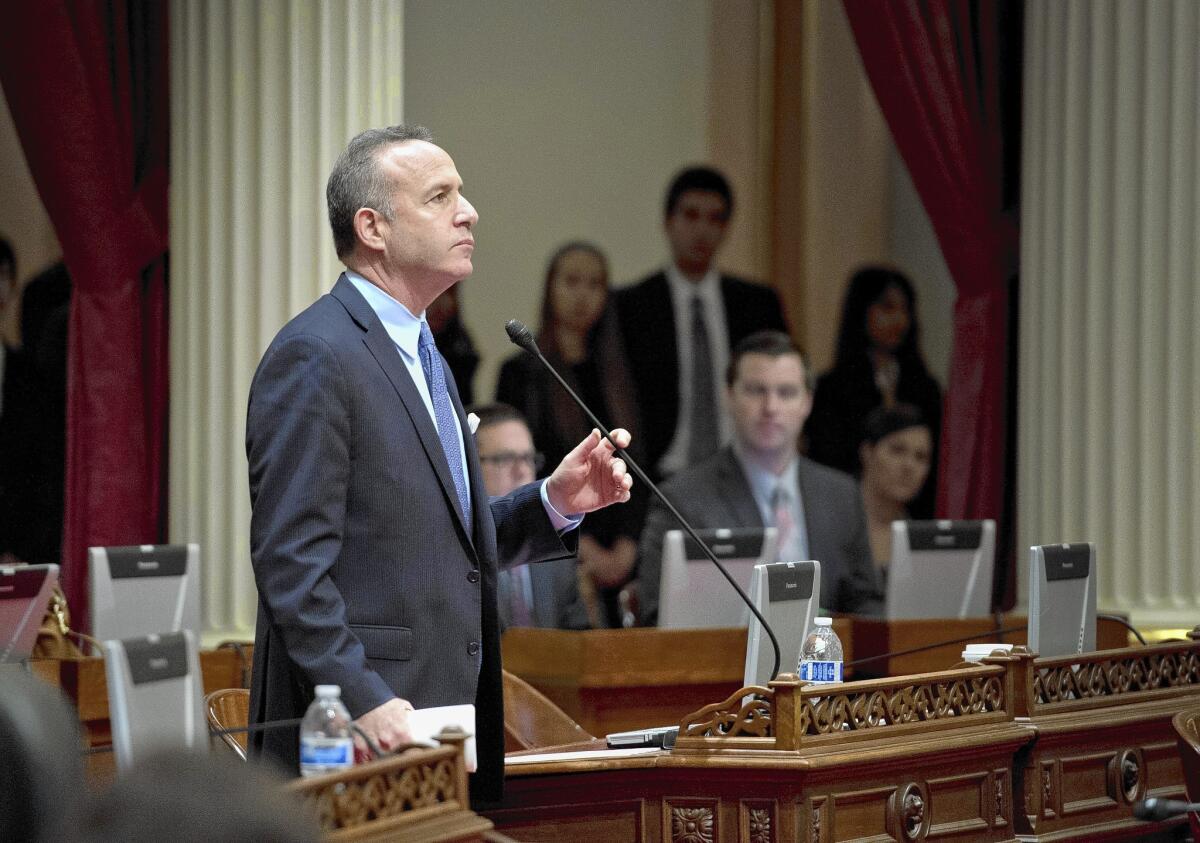Column: Fighting season for Brown, lawmakers

SACRAMENTO — High-stakes bargaining is about to begin in California’s Capitol.
As the weather heats up in Sacramento every year, so does the intensity.
There’ll be bartering over wonky programs and policies that for most citizens would be snooze-inducing.
But for Gov. Jerry Brown and legislative leaders, it’s about political positioning, agenda attaining and legacy building.
The political leaders have been laying their demands and wish lists on the negotiating table in recent days while most lawmakers were off on spring break.
Brown is seeking a rainy-day budget reserve — a forced savings plan — that is acceptable to fellow Democrats and their public employee patrons. If passed by the Legislature, it would go on the November ballot. The governor wants to campaign with the proposal while asking voters for a record fourth term. It would smartly adorn his fiscal conservative hat.
The governor also is desperately looking for money to start laying track in the San Joaquin Valley for his controversial bullet train. The $68-billion project is idling.
Enter termed-out Senate leader Darrell Steinberg.
The Sacramento Democrat has acquiesced to Brown’s proposal to use cap-and-trade money — essentially government fees for pollution licenses — to jump-start the bullet train. The senator previously was resistant.
In exchange, Steinberg wants to also use cap-and-trade money for his own priority: urban “smart growth” and mass transit.
The Senate leader is cutting in Assembly Speaker-elect Toni Atkins (D-San Diego) on the deal. She is slated to take over leadership of the lower house May 12 and would get a pile of cap-and-trade money for her top priority: low-income housing.
California’s shortage of affordable housing, she recently told me, “is all about land costs. You hear people say if you just got rid of all the regulations, you’d be able to build. But land is expensive in California.”
“Not everyone can afford market-price housing. People born here, who are Californians, should be able to live in their communities.... We really need more funding for subsidized housing.”
Especially, Atkins says, since Brown three years ago killed off redevelopment agencies.
All these priorities will be part of the budget bargaining that takes place in the next several weeks. The rainy-day fund isn’t directly related to the budget but is certain to get dragged into the negotiations as an item for old-fashioned logrolling.
The governor will revise his original $155-billion state budget proposal in mid-May. The Legislature then will have until June 15 to pass its version. Missing the deadline would cost the lawmakers their paychecks and expense money. So they won’t.
Brown wants to negotiate a rainy-day fund before everyone gets embroiled in budget brawling.
So last week he called a special session of the Legislature on the nerdy topic. In reality, there’s nothing much special about a special session. But it makes headlines and focuses attention on the subject. Special sessions are relics of a bygone era when legislators were part-timers and usually hanging out in their districts. Now they’re in the capital practically year-around.
The governor “wanted to put a rainy-day fund on the front burner,” says Deputy Finance Director H.D. Palmer.
Playing tough, Steinberg immediately shoved it to the back burner. There was no need to rush, he said. The important thing is to get it right. August is plenty of time to get it on the November ballot.
Meantime, Steinberg also has another huge spending priority, one that Brown has been cool toward: expanding kindergarten to every 4-year-old. When fully implemented, it would be a $1.4-billion annual hit. Start-up costs would be $300 million in the next budget.
So there are many bargaining chips — and probably more to surface.
Lawmakers and special interests are struggling to negotiate a water bond, which the governor really hasn’t wanted on the November ballot. For one thing, it could become a referendum on his controversial $26-billion twin-tunnel proposal for the Sacramento-San Joaquin River Delta.
But as the state suffers from a drought, the politicians would be guilty of malpractice if they didn’t offer the voters a major waterworks plan.
Also, the next Senate leader, Kevin de León (D-Los Angeles), may want in on the action. He isn’t scheduled to succeed Steinberg until after the Legislature adjourns around Labor Day, but he’s not the type to merely watch from the sidelines.
And finally, Republicans are back in the ballgame. Democrats have lost their supermajority; three senators were suspended because of criminal problems. So GOP support will be needed to pass anything that requires a two-thirds vote, such as a rainy-day fund or a water bond.
Republicans are eager to negotiate. “We always want to work toward being a ‘yes’ vote, not just being the party of ‘no,’” says Senate GOP spokesman Peter DeMarco.
The GOP managed to get a rainy-day fund passed in 2010 when budgets required a two-thirds vote and the minority party had clout. The measure was supposed to go on the 2012 ballot, but Democrats pushed it off until this year. Now they’re threatening another postponement, fearing its spending restrictions.
So Brown is offering his version. It would set aside spikes in capital gains revenue for future emergencies or debt retirement. Many Democrats are leery of that too.
For cap-and-trade — a complex program aimed at reducing greenhouse gas emissions — up to $5 billion annually is in play.
Tough legislating is seldom pretty. But all this may end up illustrating a functioning Capitol. Maybe.
More to Read
Sign up for Essential California
The most important California stories and recommendations in your inbox every morning.
You may occasionally receive promotional content from the Los Angeles Times.











